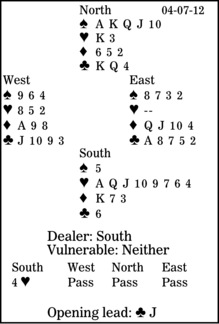Bridge column, April 7: Give him a chance to make a mistake

At the bridge table, it is an art to give your opponent a chance to make a mistake. In today's deal, how should the play go in four hearts after West leads the club jack?
It is a matter of personal preference what you open with that South hand. Some would begin with one heart, arguing that if they bid four hearts, they might miss a slam. As against that, opening one heart might allow West into the auction with a one-spade overcall, and perhaps the opponents can make four spades or have a cheap sacrifice. And since a slam is mathematically unlikely, socking it to the opponents with four hearts would be the choice of most experts.
Since the opening lead marks East with the club ace, declarer is in danger only if East takes the first trick and shifts to a high diamond, with West holding that ace. Then South could lose one club and three diamonds.
To try to reduce that risk, declarer should call for dummy's low club at trick one. Some Easts would automatically make the mistake of playing low. Then South would win at least one overtrick, since West cannot profitably shift to diamonds.
But East should notice the strong aroma of rodent wafting across the table. What is declarer doing? He must want to keep East off the lead. So East should overtake with his club ace and switch to the diamond queen.
In a class I ran earlier this year, every South covered with dummy's club queen, but most Easts won and returned a club!
** ** **
COPYRIGHT: 2012, UNITED FEATURE SYNDICATE
DISTRIBUTED BY UNIVERSAL UCLICK FOR UFS

